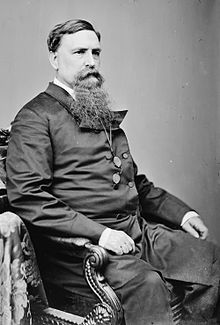Thomas Swann
| Thomas Swann | |
|---|---|
 |
|
| Member of the U.S. House of Representatives from Maryland's 4th district |
|
|
In office March 4, 1873 – March 3, 1879 |
|
| Preceded by | John Ritchie |
| Succeeded by | Robert Milligan McLane |
| Member of the U.S. House of Representatives from Maryland's 3rd district |
|
|
In office March 4, 1869 – March 3, 1873 |
|
| Preceded by | Charles E. Phelps |
| Succeeded by | William J. O'Brien |
| 33rd Governor of Maryland | |
|
In office January 10, 1866 – January 13, 1869 |
|
| Lieutenant | Christopher C. Cox |
| Preceded by | Augustus Bradford |
| Succeeded by | Oden Bowie |
| 19th Mayor of Baltimore | |
|
In office November 10, 1856 – November 12, 1860 |
|
| Preceded by | Samuel Hinks |
| Succeeded by | George William Brown |
| Personal details | |
| Born | February 3, 1809 Alexandria, Virginia |
| Died | July 24, 1883 (aged 74) Leesburg, Virginia |
| Political party |
American (1856–1860) Republican (1861–1866) Democratic (1866–1879) |
| Alma mater | The George Washington University |
| Profession | Politician |
| Signature | |
Thomas Swann (February 3, 1809 – July 24, 1883) was an American politician. Initially a Know-Nothing, and later a Democrat, he served as mayor of Baltimore (1856–1860), as the 33rd Governor of Maryland (1866–1869), and as U.S. Representative from Maryland's 3rd congressional district and then 4th congressional district (1869–1879).
Thomas Swann took the oath of office on January 11, 1865, however he did not actually assume the governors office until January 10, 1866.
Many believed once slavery was abolished in Maryland African Americans would begin a mass emigration to a new state. As white soldiers returned from southern battlefields they came home to find that not only were their slaves gone but soil exhaustion was causing tobacco crops to fail. With a growing number of disaffected white men, Thomas Swann embarked on a campaign of "Redemption" and "restoring to Maryland a white mans government."
His strategy was built on the platform of entrenching white power and displacing independent African Americans. During this same time an oyster crisis in New England caused the oyster industry in Maryland's Chesapeake Bay to surge. Swann's problem was that the Bay oyster trade was heavily African American. His solution; use government policy to push African Americans in the bay and replace them with, "White Labor, at reasonable rates wherever needed."
Even more egregious he enacted a law that encouraged white fisherman to harass black fisherman when he signed into law the states first ever "Oyster Code." “And be it acted, that all owners and masters of canoes, boats, or vessels licensed under this article, being White Men, are hereby constituted officers of this state for the purpose of arresting and taking before any judge or Justice of the Peace, any persons who may be engaged in violating any provisions of this article. Furthermore, all such owners and masters are hereby vested with the power to summon pose comitatus to aid in such arrest.”
...
Wikipedia
